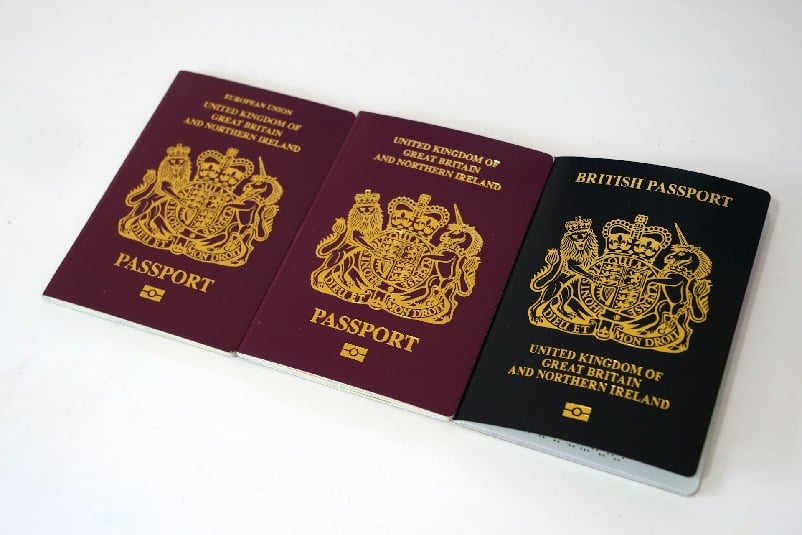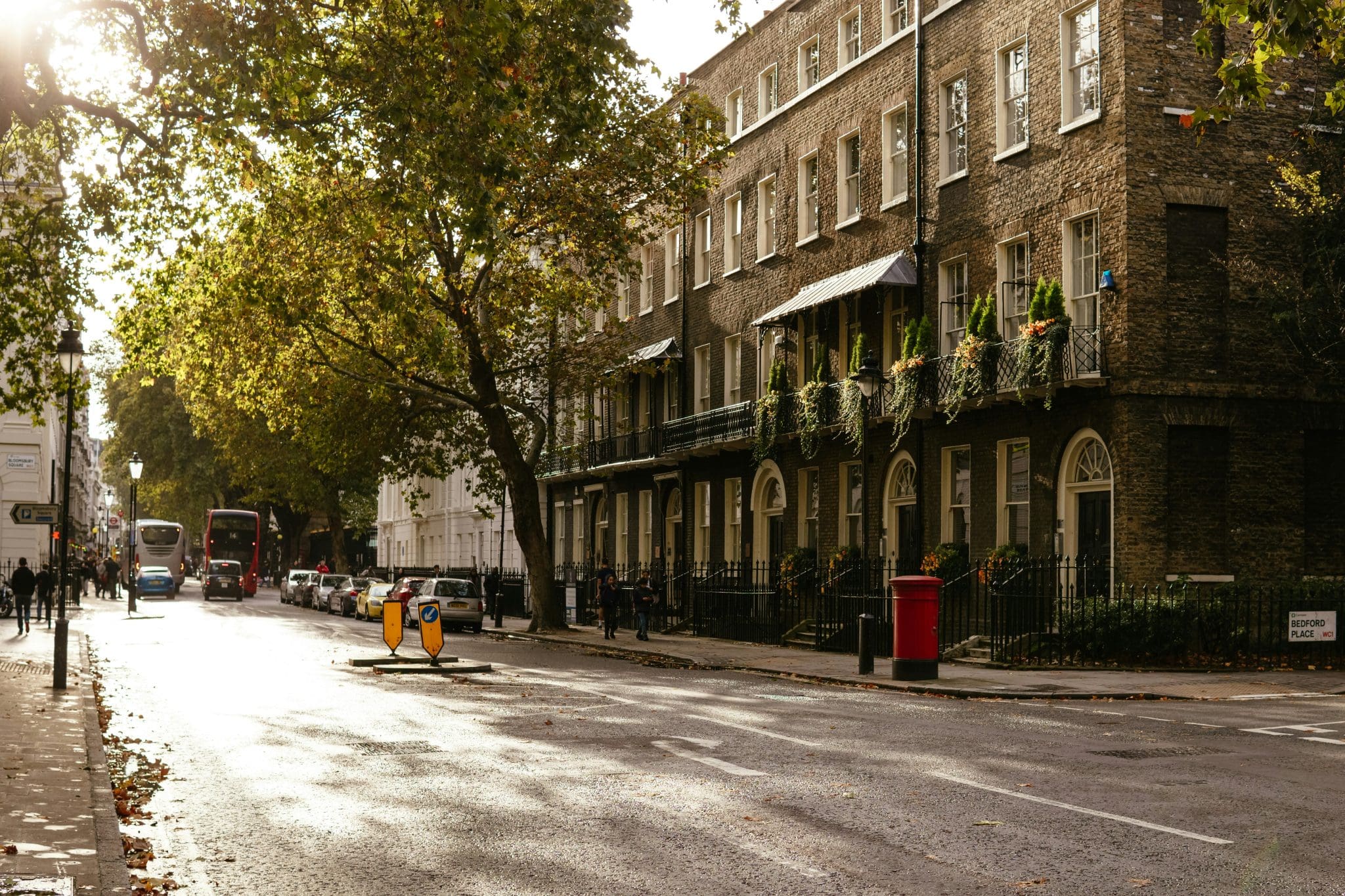Comparing the Best Countries to Study in Europe
Studying abroad can be transformative, but choosing where to study can be challenging. There are many metrics, rankings, and systems you can consider when making your choice. We look into all of them for 14 of the top countries in Europe to study. You can make your choice based on security, employability, cost, academia, experience and more, or take a look at our overall rankings to see the best country to study in Europe.
For expert advice on Student Visas in Europe, or support with applying for visas, call us on +44 (0)333 414 9244 or reach out to us online.
Read our 1001 reviews
In order to establish the best country to study in Europe, we must look at data to analyse the main reasons why students choose to study abroad. An ISB study concluded some of the primary reasons include:
- Quality of Education
- Costs
- Visa Process
- Postgraduate Routes
- Employability
- Safety
We take a look at these comparatively and then examine the merits of each country to help you decide where the best country to study in Europe really is.
Academic Comparison for Studying in Europe
The UK is one of the finest education providers in the world, with the most universities, outside of the USA, in the QS top 1500 international universities. Switzerland ranks well here, while Denmark, Germany, the Netherlands, and Sweden are globally-recognised for their academic expertise. Outside of the top countries, the quality of education is likely to vary more depending on the university, and region, but the standard in most of Europe is high.
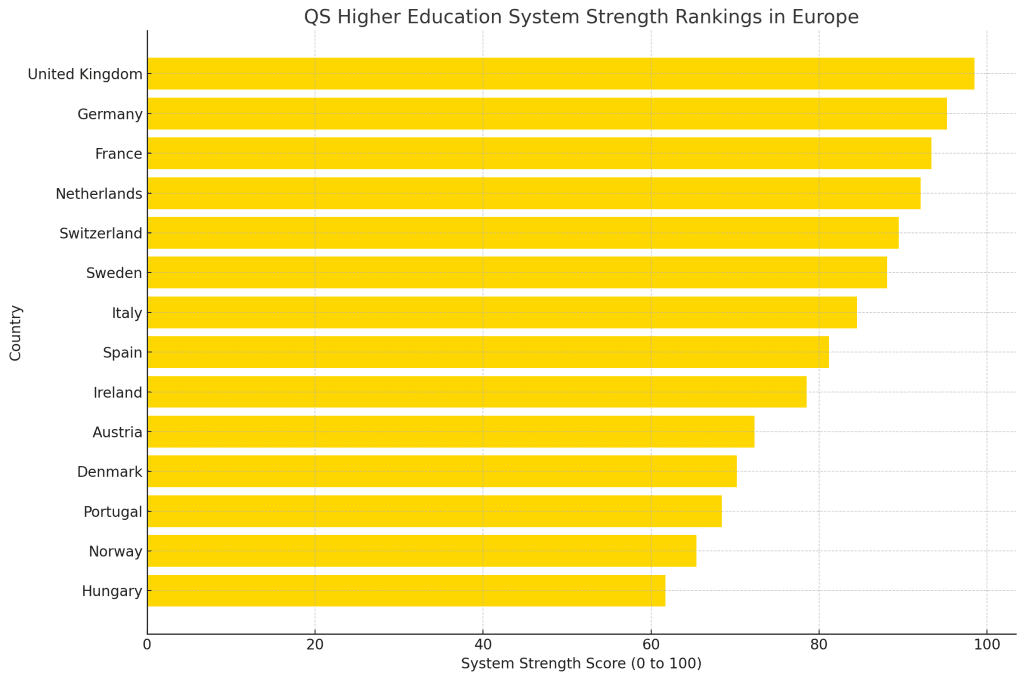
Source – QS
Top 5 based on the Quality of Academia
- UK
- Switzerland
- Denmark
- Germany
- Sweden
Costs Comparison for Studying in Europe
Costs are a growing reason for people choosing to study abroad. Generally, Europe is one of the cheapest places in the world to study, with many countries offering low-cost opportunities with significant opportunities for English tuition. Germany and Norway offer free education, even to international students, but charge fees for private universities. The UK is the exception to the rule of low-cost tuition, with Sweden and the Netherlands also charging higher fees comparatively. Many countries charge low or no fees for EEA or Swiss students.
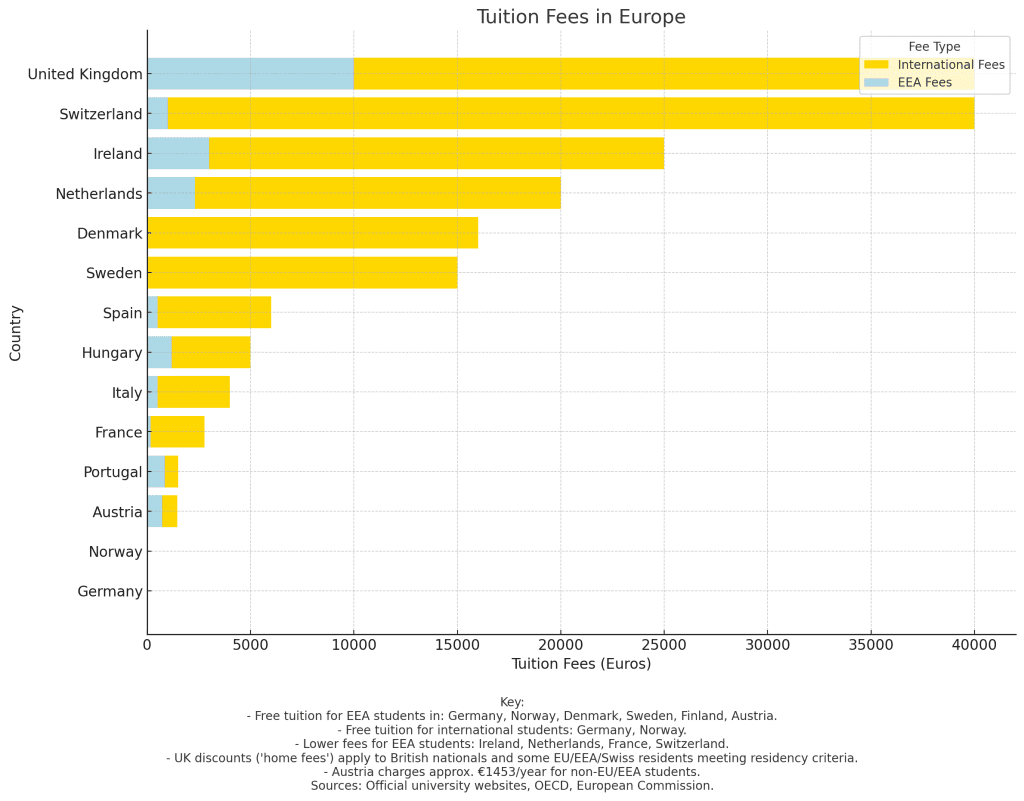
Top 5 based on Tuition Fees
- Germany
- Norway
- Austria
- Portugal
- France & Italy
Proof of Funds Comparison for Studying in Europe
Tuition fees are one side of cost comparison, the other is living costs. Living costs in Europe are generally fairly similar, with Western Europe or more specifically here, central Europe being the highest, and Eastern Europe having lower costs. Hungary offers low-cost living, with Spain and Portugal the lowest cost in Western Europe. We look at the Proof of Funds you need to show you have for a student visa in each country. While this doesn’t directly show the cost of living in each, it gives some indication, as well as shows what you need to prove in the way of funds, upfront to be eligible for a visa.
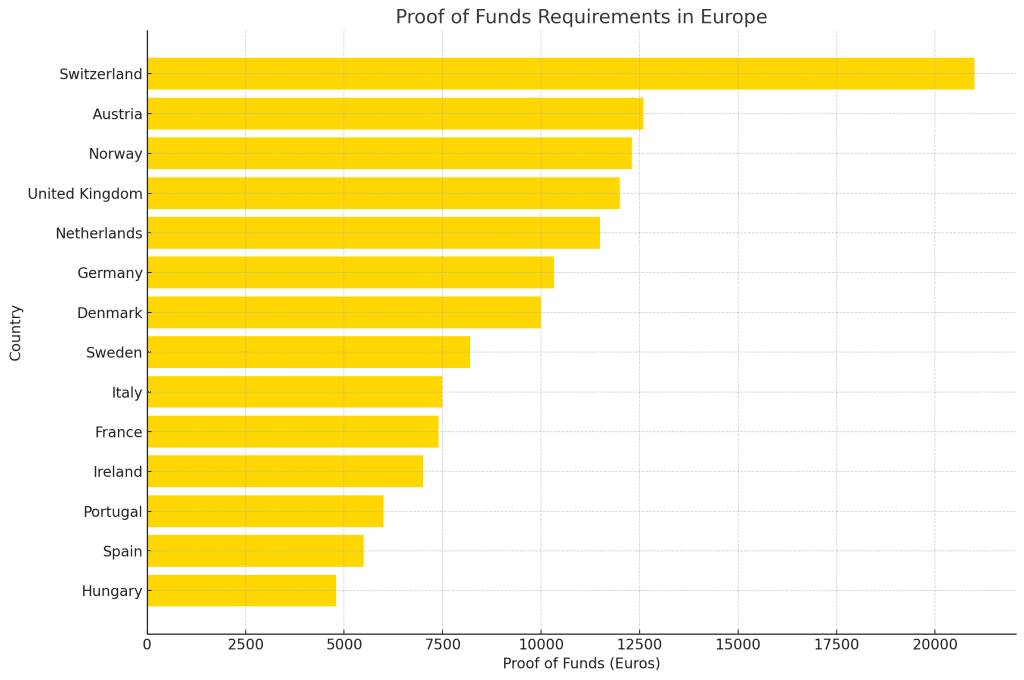
Top 5 based on Proof of Funds requirement for student visa
- Hungary
- Spain
- Portugal
- Ireland
- France
Comparison of Safety in Europe for International Students
Safety has become one of the leading factors in decision-making for international students moving abroad, according to an ISB study. Most countries in Europe are safe but to differing degrees. Scandinavia is one of the safest places to live in the world, reflecting high scores for Sweden and Denmark here. Austria and Switzerland too have an excellent score, while Ireland tops the list, followed by Portugal.
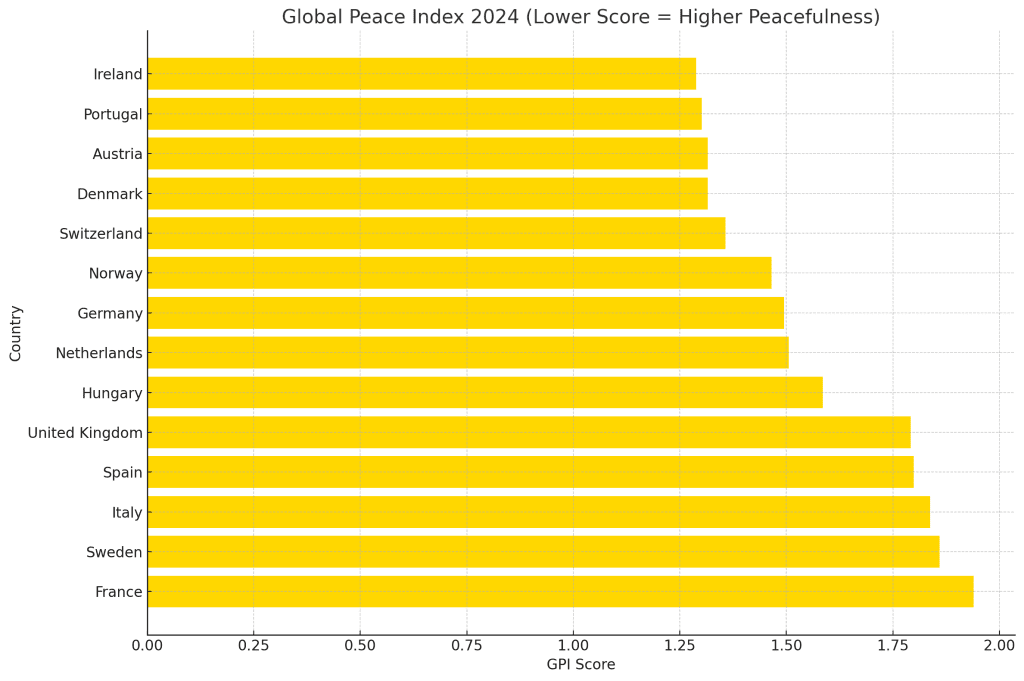
Source, Global Peace Index (2024)
Top 5 based on Safety
- Ireland
- Portugal
- Austria
- Denmark
- Switzerland
Comparing Student Experience in Europe
Student experience is an important metric for deciphering happiness, stability, and adaptation to your surroundings while at university. We compare student satisfaction, experience and cultural experience to show the best in Europe. All countries in Europe fare well here.
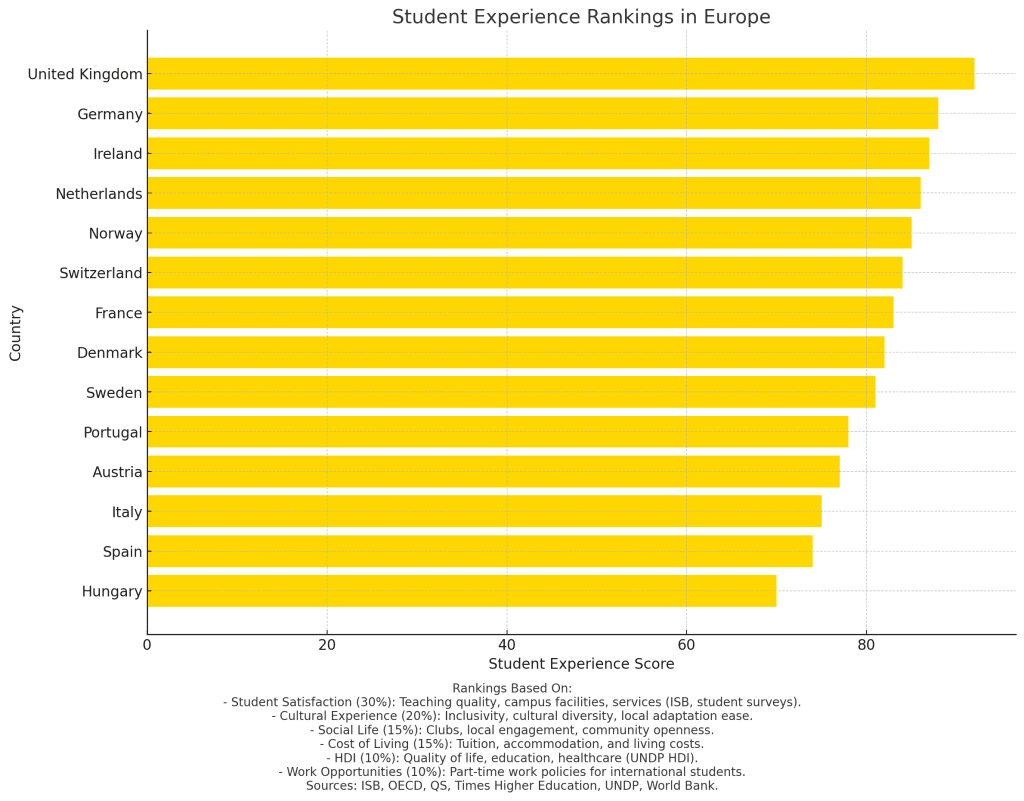
Top 5 based on Student Experience
- UK
- Germany
- Ireland
- Netherlands
- Norway
Comparing Graduate Employability in Europe
Employability was previously the primary reason that students chose to study abroad, according to an ISB study. That was recently replaced by safety, but employability remains a key reason why students are looking to Europe for study with excellent opportunities. We look at degree recognition, post-study work opportunities, graduate employment rates, language advantages and ease of obtaining work permits to decide the best places in Europe for employability.
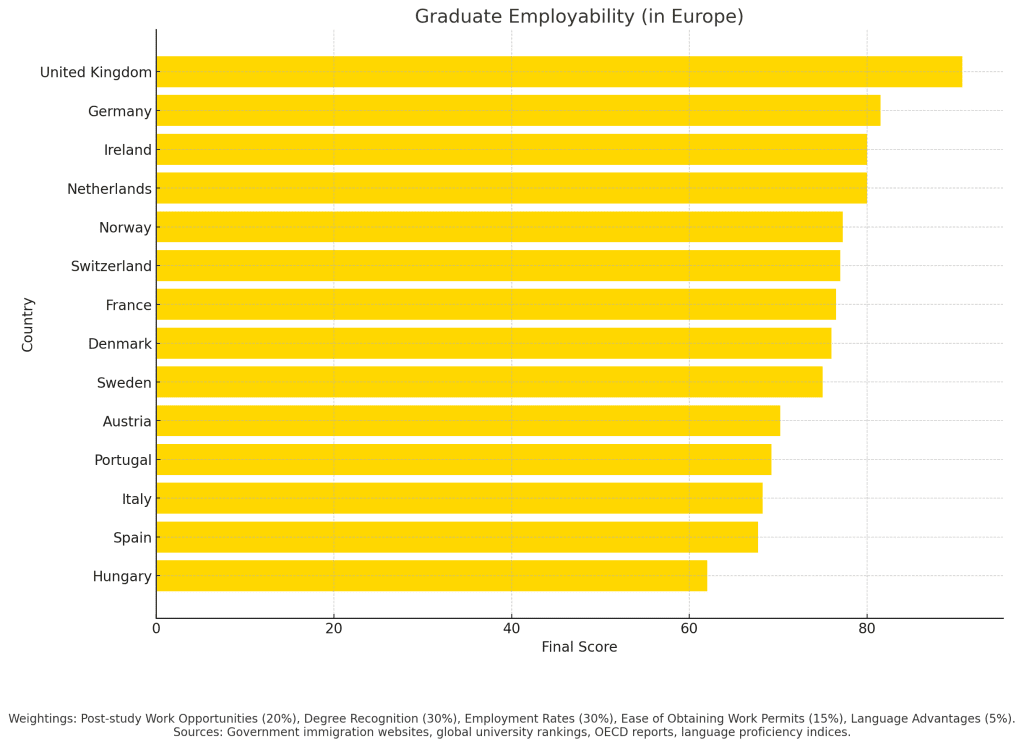
Top 5 based on Graduate Employability
- UK
- Germany
- Ireland
- Netherlands
- Norway
Postgraduate Routes Compared for Countries in Europe
Postgraduate routes are one of the main reasons students choose to study abroad. Opportunities are rife in most of Europe, with some countries offering easier pathways to work, residency and citizenship. We look into the merits of each, to assess your long-term options in each host country.
Top 5 based on Graduate Employability
- Germany
- Netherlands
- Ireland
- UK
- Sweden
| Country | Graduate Visa Option | Work Permit Possibilities | Pathway to Permanent Residency/Citizenship |
| Germany | 18-month Job-Seeker Visa | EU Blue Card (high-skilled), Work Visa (salary threshold: €56,400/yr) | PR after 2-5 years; Citizenship after 8 years (shorter with integration courses) |
| Netherlands | Orientation Year Visa (1 year) | Highly Skilled Migrant Visa, EU Blue Card (salary threshold: €38,000/yr) | PR after 5 years of work; Citizenship after 5 years |
| Ireland | 1-2 year Graduate Scheme (Stamp 1G) | Critical Skills Employment Permit (salary threshold: €30,000/yr) | PR after 5 years of work; Citizenship after 5 years |
| United Kingdom | Graduate Visa (2 years) | Skilled Worker Visa (salary threshold: £38,700/yr) | ILR after 5 years of work; Citizenship after 1 year of ILR |
| Sweden | Post-Graduation Work Permit (up to 12 months) | Work Visa for skilled workers (no salary threshold specified) | PR after 4 years; Citizenship after 5 years |
| France | APS (2 years) | Work permit for skilled or sponsored workers (no salary threshold specified) | PR after 5 years; Citizenship after 5 years |
| Denmark | Establishment Card for graduates (up to 2 years) | Work permits available for skilled workers, including EU Blue Card | PR after 5 years of continuous residence; Citizenship after 9 years |
| Switzerland | Short-term permits for job-seeking | Requires employer sponsorship for work permits (salary threshold: CHF 120,000/yr) | PR after 10 years; Citizenship after 12 years (shorter for EU/EFTA nationals) |
| Italy | Post-Graduation Visa (up to 12 months) | Work permits for skilled workers, salary threshold: €24,000/yr | PR after 5 years of residence; Citizenship after 10 years |
| Spain | Post-Graduation Visa (up to 1 year) | EU Blue Card & work permits for skilled workers (salary threshold: €22,000/yr) | PR after 5 years of residence; Citizenship after 10 years |
| Portugal | Job-Seeking Visa (6 months) | Work permits available for skilled positions | PR after 5 years of residence; Citizenship after 5 years of continuous residence |
| Austria | Red-White-Red Card for graduates (up to 2 years) | Highly Skilled Migrant Visa (salary threshold: €45,000/yr) | PR after 5 years of residence; Citizenship after 10 years |
| Hungary | Temporary Residence for Employment for job-seekers | Work permits for high-skilled jobs, lower thresholds than most EU countries | PR after 3-5 years; Citizenship after 8 years |
How we ranked
We have given each country a ranking based on the following weightings:
- Academia: 25%
- Employability: 20%
- Postgraduate Routes: 20%
- Costs: 15%
- Student Experience: 10%
- Safety: 10%
Verdict – Best countries in Europe to study (in order)
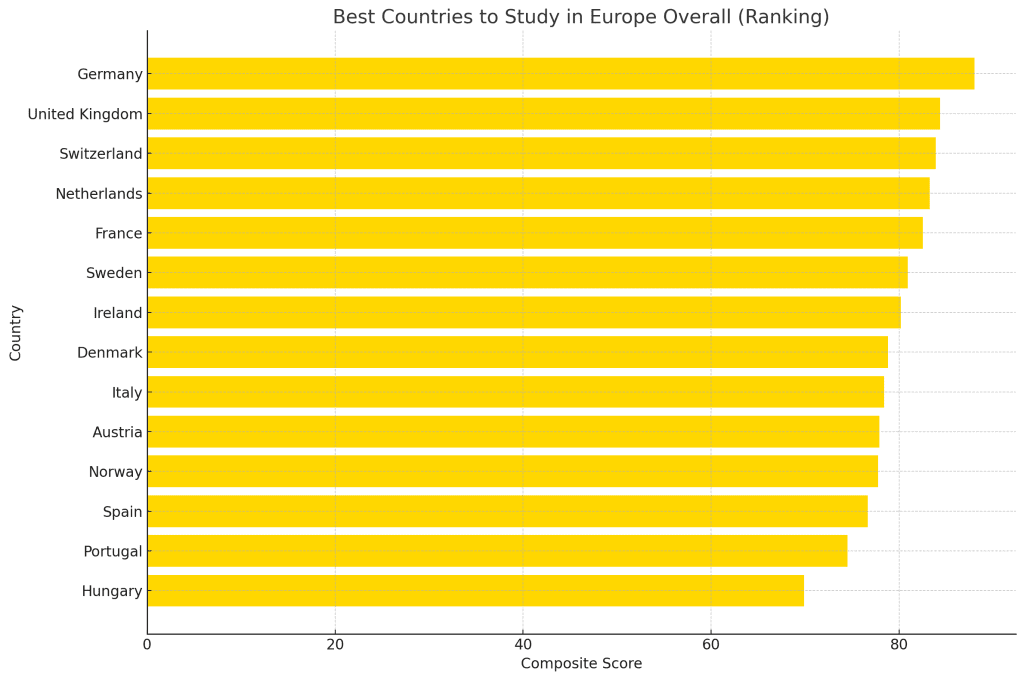
1. Germany (Winner)
Germany performs across all categories, with the lowest-cost tuition and one of the highest ranks for academia. It is one of the leading countries for employability and postgraduate routes, as well as being a safe and prosperous nation. It is one of the most popular countries worldwide for international students for a reason.
- Strengths:
- Excellent academia, especially in STEM and technical fields.
- Strong employability and robust postgraduate routes (EU Blue Card).
- Affordable tuition and proof of funds requirements.
- High student satisfaction and strong safety ratings.
2. United Kingdom (Runner-Up)
- Strengths:
- Leading employability and world-class institutions.
- Strong postgraduate routes (Graduate Route Visa and PR pathways).
- Higher costs but balanced by excellent academic and employability scores.
3. Switzerland
- Strengths:
- Top-tier academia and employability, especially in sciences and engineering.
- Excellent safety and quality of life.
- High costs and stricter postgraduate options lower its rank slightly.
4. Netherlands
- Strengths:
- Moderate tuition costs, strong academia, and excellent safety.
- Postgraduate routes are accessible and employability is high.
- Offers a balanced student experience.
5. France
- Strengths:
- Affordable tuition fees and proof of funds compared to other Western European nations.
- Solid academic standing and employability scores.
- Good postgraduate opportunities for skilled workers.
- Strong cultural appeal for students, yet some language barriers persist.
6. Sweden
- Strengths:
- High safety, quality of life, and academic reputation in sustainability.
- Postgraduate routes are accessible but not as robust as Germany or the UK.
- Costs are moderate; employability is decent.
7. Ireland
- Strengths:
- Moderate tuition and proof of funds.
- Good employability and academic scores, especially in business and tech fields.
- Postgraduate routes like Stamp 1G are accessible but not as competitive as other countries.
- Cultural and student satisfaction scores are strong.
8. Denmark
- Strengths:
- Strong safety and quality of life.
- High academic reputation, especially in environmental studies and engineering.
- Moderate costs but limited postgraduate opportunities.
9. Italy
- Strengths:
- High cultural appeal and growing academic reputation in arts and humanities.
- Affordable costs but weaker employability and postgraduate routes compared to top countries.
- Language barriers can present an issue in day-to-day life
10. Austria
- Strengths:
- Affordable tuition and living costs.
- Good academic and safety scores.
- Moderate postgraduate opportunities but not as strong as Germany or the UK.
11. Norway
- Strengths:
- Free tuition even for international students
- High standard of living and safety
- Good student culture
- Less post-grad options, and standard of education not as high as others in Scandinavia
12. Spain
- Strengths:
- Affordable tuition fees and living costs compared to Northern European countries.
- High cultural appeal and student satisfaction.
- Strong in humanities, arts, and social sciences.
- Postgraduate options are good but less flexible compared to Germany or the UK.
- Safety and quality of life are strong, but employability is lesser
13. Portugal
- Strengths:
- Affordable education and proof of funds requirements.
- Strong cultural and student satisfaction scores.
- Academic reputation is growing, particularly in technology and social sciences.
- Postgraduate options are available but less robust than Germany or the Netherlands.
14. Hungary
- Strengths:
- Extremely affordable tuition fees and living costs.
- Strong in medical education (especially popular for international students).
- Decent safety but slightly lower in employability and postgraduate pathways.
- Cultural richness and rising academic reputation in Central Europe.
European Countries (an Overview)
Germany #1

Academia
Germany is famous for its academic excellence in engineering, business, and social sciences. Institutions such as LMU Munich, Heidelberg University, and the Technical University of Munich have remained in the QS top 100 international universities. German universities are among the best in the world and attract many international students, especially in the array of courses instructed primarily in English.
Top Universities:
- LMU Munich (#64 QS 2024)
- Heidelberg University (#64 QS 2024)
- Technical University of Munich (#50 QS 2024)
Germany has 47 universities in the QS Top 1500.
Student Experience
Students from abroad have a lively academic setting in Germany, where they can experience changing environments in cities like Munich and Berlin. The country is dedicated to student welfare, and academic support.
Quality of Life
Germany has a very high rank in terms of safety and overall quality of life. Aspects such as the stable political climate, a strong healthcare system, and overall high living standards make Germany an attractive place for international students.
Postgraduate Routes & Settlement
Germany offers post-graduate options after study, including the 18-month job-seeking visa, a great way to prolong your stay without a high-paying job offer. Graduates are then eligible to seek permanent residency in 33 months or 21 months if they prove their proficiency in the German language after getting a job. After that, the EU Blue Card offers a chance to stay long-term. You need a job offer paying over €45,300, though this can be lower in some shortage occupations. Citizenship can take five years.
Ease of Visa
Visa formalities for studying in Germany are relatively simple. Students must demonstrate their financial capacity, have a confirmed offer at a university, and show health insurance coverage. The procedure is generally quick and takes around 2 weeks, but it can sometimes take up to 4 months.
Cost Breakdown
| Tuition Fees | EUR 0 – 1,500 (public universities) |
| Proof of Funds | EUR 10,332 |
| Visa Fee | EUR 75 |
| Healthcare | EUR 100-150/month (student insurance) |
United Kingdom #2

Academia
The United Kingdom is typically regarded, next to the USA, as the best in the world in academics, especially in law, business, engineering, and the humanities. Institutions such as the University of Oxford, University of Cambridge, and Imperial College London always appear in the top 10 universities globally, with the former consistently in the top 5. Historically, education and modern research facilities have made the UK a top choice for international students.
Top Universities:
- University of Oxford (#3 QS 2024)
- University of Cambridge (#2 QS 2024)
- Imperial College London (#6 QS 2024)
The UK has 90 universities among the QS Top 1500 rankings.
Student Experience
The UK provides international students with a solid academic background and multicultural exposure. Places such as London, Manchester, and Edinburgh have lively campuses, first-rate libraries, and rooms to discuss world viewpoints with the student community.
Quality of Life
The UK offers a high standard of living, primarily due to solid healthcare services via the National Health Service (NHS). It provides security and comfort to its residents. It also has a unique cultural history and advanced infrastructure, making it favorable to travelers.
Postgraduate Routes & Settlement
The UK has the Graduate Route Visa, which enables students to stay up to two years (three years for PhD graduates) after finishing their studies to find a job. Skilled workers with job offers can switch to work visas, enabling them to likely gain indefinite leave within five years to remain (settled status). Citizenship is possible after six years of lawful residence.
Ease of Visa
The UK has a well-defined visa process for overseas students. If you have an offer from a recognized university, proof of English proficiency, and proof of financial support, UK student visas normally pass without trouble. The procedure is generally easy, and the decision regarding a visa is made in around three weeks.
Cost Breakdown
| Tuition Fees | GBP 10,000 – 38,000 (public universities) |
| Proof of Funds | GBP 1,334 per month (outside London) |
| Visa Fee | GBP 363 |
| Healthcare | GBP 470/year (immigration health surcharge) |
Switzerland #2

Academia
Switzerland is famous worldwide for its academic excellence, especially in STEM, business, and hospitality management. ETH Zurich, EPFL (Ecole Polytechnique Federale de Lausanne), and the University of Zurich rank among the world’s top universities. With many programs taught in English, Switzerland is an excellent choice for international students who want a top-quality education.
Top Universities:
ETH Zurich (7th QS 2024)
- EPFL (14th QS 2024)
- University of Zurich (83rd QS 2024)
In Switzerland, there are 11 universities in the QS Top 1500 rankings.
Student Experience
Students who come to Switzerland from abroad enjoy the advantages of an international environment, innovative academic settings, and stunning landscapes. Zurich, Geneva, and Lausanne cities have lively student communities, good public transport, and cultural and outdoor facilities.
Quality of Life
Switzerland is one of the best places in the world to live. The Global Peace Index has a score of 1.37, the lowest in the world (best), and the Human Development Index indicates 0.962, which is also nearly the highest globally. The country provides political stability, world-class healthcare, and stunning natural beauty, from the Alps to crystal lakes. Its multicultural environment and sustainability are the two main reasons it is a great place for students. The one downside is that living costs are expensive.
Postgraduate Routes & Settlement
Switzerland provides post-study options for international graduates. Students can be issued a six-month job-seeking visa to find a job. Those who secure employment then move to a residence permit tied to the job. Permanent residence, in normal circumstances, is possible after 10 years. However, for EU/EFTA citizens, this time frame can be reduced. Citizenship can be applied after 10 years of residence as long as the integration criteria are fulfilled.
Ease of Visa
Switzerland’s student visa process is streamlined and efficient, yet it takes the applicants time and complete documentation. The need for proof of admission to university, financial resources, and health insurance is also part of the requirements. In most cases, the visa application processing period runs for 8 to 12 weeks. The process is more accessible than most Swiss visas but still comes with challenges.
Cost Breakdown
| Tuition Fees | CHF 1,000 – 8,000 (public universities) |
| Proof of Funds | CHF 21,000 per year |
| Visa Fee | CHF 65 |
| Healthcare | CHF 100-150/month (student insurance) |
Netherlands #4
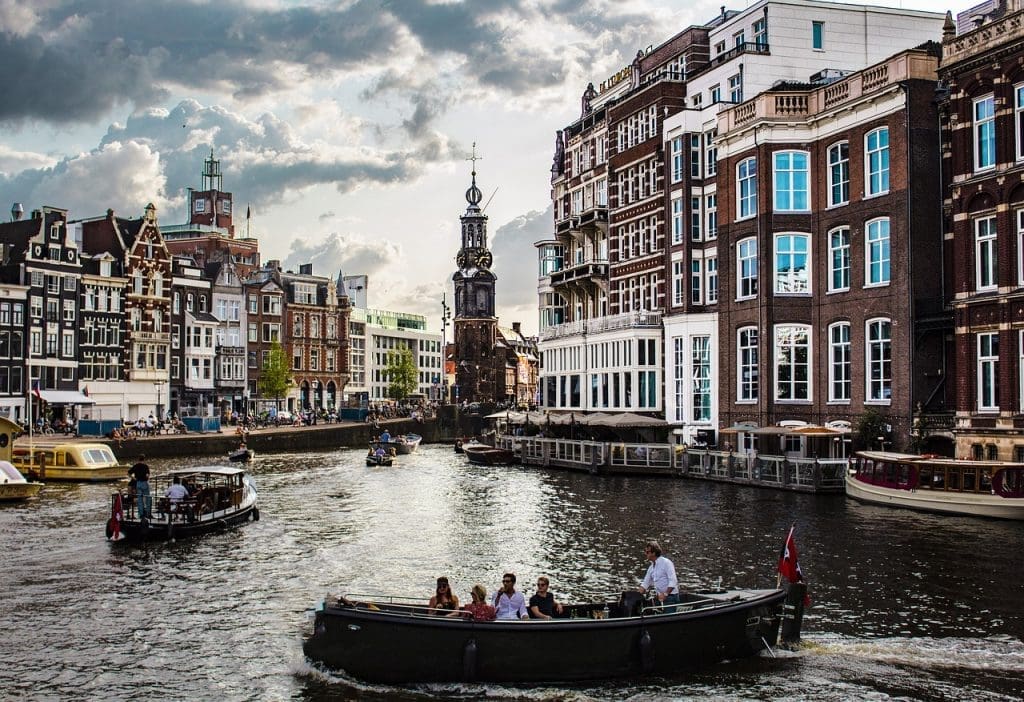
Academia
The Netherlands offers state-of-the-art facilities and a high-level professional education in environmental sciences, engineering, and business. With more than 2,100 programs taught in English, the Netherlands is the end destination for international students who want top-tier education in a diverse society.
Top Universities:
- Delft University of Technology (#47 QS 2024)
- University of Amsterdam (#52 QS 2024)
- Wageningen University & Research (#115 QS 2024)
The Netherlands has 13 institutions that fall into the QS Top 1500 rankings.
Student Experience
International students are afforded a vibrant academic and cultural experience in The Netherlands. Cities such as Amsterdam, Utrecht, and Rotterdam have become important European cultural hubs with large and diverse student populations, numerous leisure options, and an international approach.
Quality of Life
The Netherlands is among the world’s most secure and visionary countries, providing an excellent quality of life. The country’s Peace Index of 1.57 and HDI score of 0.944 are good regarding political stability, high-quality healthcare, and sustainability. The eco-friendly transport environment and modern cities also make it a great place for learning and living.
Postgraduate Routes & Settlement
The Netherlands is student-friendly when it comes to staying longer after graduation. The Orientation Year Visa, also called zoekjaar, grants graduates the right to live in the country for one year to search for a job. Once employed, they can then apply for a Highly Skilled Migrant Visa or EU Blue Card, thereby establishing the Netherlands as a launch pad for long-term settlement. You can apply for citizenship on a work—or family-based visa after five years.
Ease of Visa
Transparency and efficiency are the hallmarks of the Dutch visa process. Students have to prove they have enough money, an admission letter from a university, and they also need health insurance. The visa processing time is usually quick, with only 2 to 4 weeks necessary, making the Netherlands a popular choice for students from abroad.
Cost Breakdown
| Tuition Fees | EUR 6,000 – 15,000 (public universities) |
| Proof of Funds | EUR 11,000 per year |
| Visa Fee | EUR 171 |
| Healthcare | EUR 450-600/year (student insurance) |
France #5

Academia
France is known for its academic excellence in the fields of business, art, and engineering. Educational institutions like Sorbonne University, École Polytechnique, and HEC Paris are referenced worldwide for their impressive programs and progressive research. With many courses taught in English and recognition for creativity and critical thinking, France is popular among students from all corners of the world.
Top Universities:
- École Polytechnique (#28 QS 2024)
- Sorbonne University (#59 QS 2024)
- HEC Paris (#16 QS Global MBA 2024)
France has 41 universities in the QS Top 1500 rankings.
Student Experience
France is a country where international students find themselves in an enriching academic and cultural setting. The places like Paris, Lyon, and Toulouse are full of students but also carry the historic charm of the surroundings. France has famous museums, multicultural cuisine, and an artsy culture. The Studyportals survey shows a 4.3 out of 5 student satisfaction score for France, resulting from the perfect combination of quality education and cultural immersion.
Quality of Life
France is well-known for its high quality of life, strong healthcare systems, security, and cultural opportunities. it is a stable and appealing place for international students.
Postgraduate Routes & Settlement
France has a Job-Seeker/Talent Passport visa for overseas graduates that allows them to stay in the country for one year while they look for a job. Once they land a job, they can apply for a work visa. Permanent residency is granted after five years of living, and citizenship is also available after the same time if the integration criteria are met.
Ease of Visa
The procedure for getting a French student visa is simple. It requires only proof of having enough money, being accepted to a registered institution, and having health insurance. It usually takes three to eight weeks.
Cost Breakdown
| Tuition Fees | EUR 170 – 3,700 (public universities) |
| Proof of Funds | EUR 615 per month |
| Visa Fee | EUR 99 |
| Healthcare | EUR 28-40/month (student insurance) |
Sweden #6
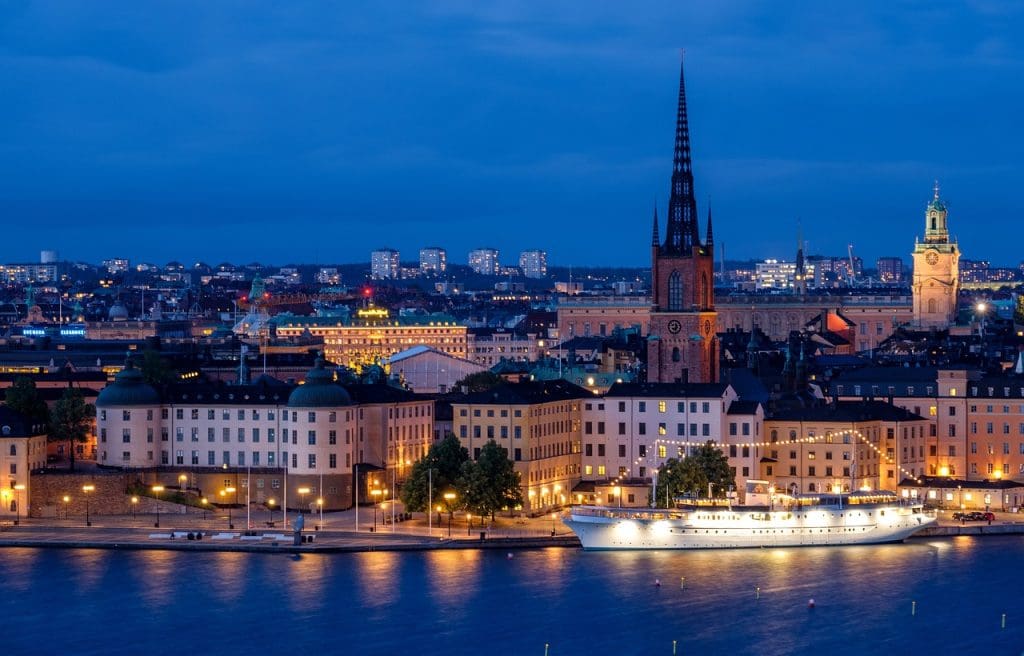
Academia
Sweden is recognised globally for its high-quality education, particularly in technology, social sciences, and environmental studies. Top universities like Karolinska Institute, Lund University, and KTH Royal Institute of Technology provide exceptional research opportunities and a progressive academic environment.
Top Universities:
- Karolinska Institute (#40 QS 2024)
- Lund University (#97 QS 2024)
- KTH Royal Institute of Technology (#89 QS 2024)
Sweden has 14 universities in the QS Top 1500.
Student Experience
Sweden offers a highly inclusive student experience, focusing on collaborative learning and innovation. The country ranks high for student satisfaction, and provides excellent support services for international students. Swedish cities like Stockholm and Gothenburg offer a vibrant, multicultural environment, making them exciting places to live and study.
Quality of Life
Sweden’ offers a high quality of life, an excellent healthcare system, and political stability. These factors make it an ideal destination for international students seeking a safe and high-standard living environment.
Postgraduate Routes & Settlement
Graduates in Sweden can extend their stay with a 12-month job-seeking visa and later apply for a residence permit for work. The country’s immigration policies make it relatively easy for international students to transition to permanent residency if they secure a job within a few years.
Ease of Visa
Sweden’s student visa process is simple. Students must prove financial resources, provide a confirmed university offer, and show proof of health insurance. Working during your studies is also allowed, with no restrictions on how many hours you can work per week.
Cost Breakdown
| Tuition Fees | SEK 80,000 – 150,000 (public universities) |
| Proof of Funds | SEK 8,568 per month |
| Visa Fee | SEK 1,500 |
| Healthcare | SEK 300-600/month (student insurance) |
Ireland #7

Academia
The Irish education system is recognised for its technology, business, and life sciences quality. Some universities have global reputations, including Trinity College Dublin, University College Dublin, and the National University of Ireland Galway, all holding a significant position among the world’s best universities. With its high level of creativity and English-taught programs, Ireland is highly sought after by students from all over the world desiring a balance of academics and life.
Top Universities:
- Trinity College Dublin (#81 QS 2024)
- University College Dublin (#98 QS 2024)
- National University of Ireland Galway (#258 QS 2024)
Ireland has 8 universities in the QS Top 1500 rankings.
Student Experience
The international students can be assured of a warm and friendly atmosphere in Ireland, with cities like Dublin, Cork, and Galway functioning as central student areas. The country is well-known for its hospitable natives, cultural heritage, and highly developed art scene. Ireland is a welcoming country with a strong sense of community and solid academic support systems.
Quality of Life
With high safety, social welfare, and wellbeing, Ireland has a Peace Index rating of 1.39 and a Human Development Index of 0.945. The Irish countryside, with its breathtaking views ranging from the wild and rocky coastline to the rolling hills, and Ireland’s excellent health care system and progressive measures, are the main reasons students come here for their studies and personal development.
Postgraduate Routes & Settlement
Ireland is an outstanding graduate country for post-study work. Those eligible programs can apply for the Third Level Graduate Scheme Visa to live in the country for up to 2 years to find a job. This can be a start for workers, who can apply for a General Employment Permit or Critical Skills Employment Permit, which can open up avenues to long-term residency. The status of a citizen is accessible after five years of residency.
Ease of Visa
Ireland’s student visa scheme is simple and direct.The applicants’ main obligations are proof of financial ability, medical insurance, and a confirmed admission letter from a recognized institution. Visa applications usually take 4 to 8 weeks to process.
Cost Breakdown
| Tuition Fees | EUR 9,000 – 20,000 (public universities) |
| Proof of Funds | EUR 7,000 per year |
| Visa Fee | EUR 60 |
| Healthcare | EUR 500-700 per year (student insurance) |
Denmark #8
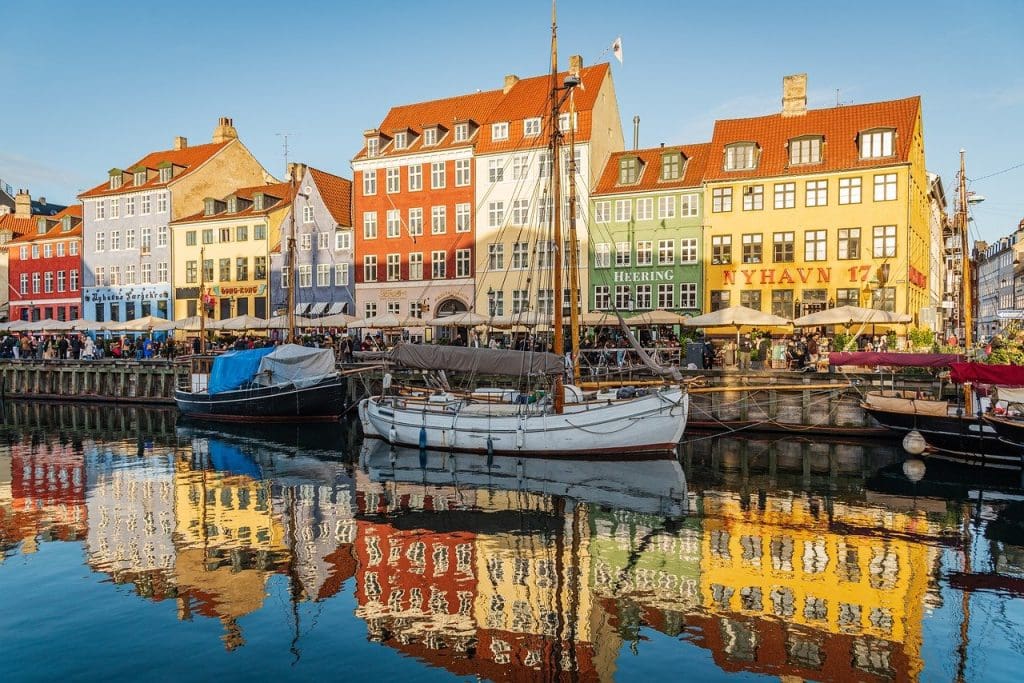
Academia
Denmark is well known for its educational system, which is characterised by creativity, innovation, and environmental sustainability. Universities such as the University of Copenhagen, Aarhus University, and the Technical University of Denmark are famous all over the world for their research output and quality of teaching. With various English-taught programs that cut across fields such as environmental science, engineering, and business, Denmark attracts a healthy mixture of international students from different parts of the world.
Top Universities:
- University of Copenhagen (#67 QS 2024)
- Aarhus University (#107 QS 2024)
- Technical University of Denmark (#113 QS 2024)
Denmark has 6 universities listed in the QS Top 1500 rankings.
Student Experience
Denmark provides international students with an academic and culturally enriching experience. Schools in cities such as Copenhagen, Aarhus, and Aalborg are the most preferable to students because they are equipped with modern facilities, have a vibrant student community, and are focused on sustainability. It offers an inclusive culture and innovative educational system.
Quality of Life
Denmark is continuously one of the happiest and safest countries worldwide. It has a Peace Index score of 1.29 and an HDI of 0.948. Denmark provides students with a pleasant and secure environment, good healthcare, a flourishing green culture, and first-class public services. The attitude towards work-life balance and environmental sustainability makes the country attractive for expats.
Postgraduate Routes & Settlement
Students in Denmark can apply for a job-seeking visa to stay in the country for two years while trying to get a job. The Fast-Track Scheme and Green Card residence permits are among the pathways for such skilled graduates to stay and be part of the workforce, to be enacted by the Danish authorities. With eight years of uninterrupted residence, you can gain permanent residency, followed by nine years of citizenship.
Ease of Visa
Denmark’s visa system is known for its transparency and effectiveness. Students must submit proof of funds, a confirmed offer of admission, and proof of valid health insurance. The typical processing time is between 2 and 3 months, making the transition for those wanting to study in Denmark as smooth as possible.
Cost Breakdown
| Tuition Fees | DKK 45,000 – 120,000 (public universities) |
| Proof of Funds | DKK 13,500 per month |
| Visa Fee | DKK 1,000 |
| Healthcare | Free (with CPR registration) |
Italy #9

Academia
Italy is famous for its long academic tradition in many areas, such as architecture, art, design, and engineering. The University of Bologna, Politecnico di Milano, and Sapienza University of Rome are some of the oldest in the world. Institutions rank high in global assessments of their education and research output and provide excellent humanities courses in addition to contemporary innovations. Due to the growing population of international students, there is a wide range of English-taught courses.
Top Universities:
- Politecnico di Milano (#123 QS 2024)
- University of Bologna (#154 QS 2024)
- Sapienza University of Rome (#161 QS 2024)
Italy has 40 universities listed in the QS Top 1500 rankings.
Student Experience
International students in Italy face a rare combination of rich cultural traditions and vibrant academic courses. Milan, Rome, and Florence offer students a rich cultural experience with museums, historical sites, and colourful nightlife.
Quality of Life
Italy has a high standard of life not just because of the Mediterranean climate but also because of its famous culinary tradition and picturesque scenery. Italy’s art and history, its friendly environment, and its vibrant integration of these with daily life make it very popular among students.
Postgraduate Routes & Settlement
Italy allows graduates to stay for a maximum of a year after completing their studies. The Permesso di Soggiorno (residence permit) can be lengthened if graduates get a job; thus, they can switch to long-term residency permits. After five years of residency, you can apply for permanent residency, while citizenship is granted after a decade.
Ease of Visa
Italy has a simple student visa application process, which requires students to demonstrate financial stability, confirm admission to an Italian institution, and provide health insurance coverage. The process usually takes 4 to 6 weeks.
Cost Breakdown
| Tuition Fees | EUR 900 – 4,000 (public universities) |
| Proof of Funds | EUR 6,000 – 8,000 per year |
| Visa Fee | EUR 116 |
| Healthcare | EUR 150-300/month (student insurance) |
Austria #10

Academia
The country is recognised for quality education, especially in music, arts, and social sciences. Institutions like the University of Vienna, Vienna University of Technology, and Graz University of Technology stand out in their academic and research departments. With low tuition and a significant number of English-taught programs.
Top Universities:
- University of Vienna (#151 QS 2024)
- Vienna University of Technology (#179 QS 2024)
- Graz University of Technology (#277 QS 2024)
Austria has 9 universities in the QS Top 1500 rankings.
Student Experience
Austria offers students a high level of educational quality and different cultural activities. The cities of Vienna, Graz, and Innsbruck are the center of student life, offering the opportunity to enjoy unique cultural events, historic buildings, and mountain views. Austria has a quality, supportive academic environment, and lively atmosphere.
Quality of Life
Austria is among the best, with a high quality of life and safety. It is also one of the safest and most prosperous countries in Europe. Austria’s strong healthcare system, clean environment, and cultural diversity make living conditions good for students. Vienna’s reputation as one of the most livable cities in the world reinforces its attractiveness to international students.
Postgraduate Routes & Settlement
Austria offers international graduates the opportunity to apply for a Red-White-Red Card for skilled workers, which allows them to remain and work in the country. After five years of residency, permanent residence can be applied for, and after ten years, citizenship can be obtained if the integration conditions are followed.
Ease of Visa
The student visa system in Austria requires proof of academic admission, proof of funds, and health insurance as visa requirements. It usually takes four to eight weeks for processing.
Cost Breakdown
| Tuition Fees | EUR 1,500 – 5,000 (public universities) |
| Proof of Funds | EUR 9,000 per year |
| Visa Fee | EUR 150 |
| Healthcare | EUR 400-600/year (student insurance) |
Norway #11
Academia
Norway offers a highly regarded education system with a strong focus on STEM fields, environmental studies, and sustainable development. Public universities in Norway are tuition-free for both domestic and international students, making it an attractive destination for those seeking high-quality education at an affordable cost. English-taught programs, particularly at the postgraduate level, are widely available, providing accessibility to a global student base.
Top Universities:
- University of Oslo (#102 QS 2024)
- Norwegian University of Science and Technology (NTNU) (#116 QS 2024)
- University of Bergen (#181 QS 2024)
Norway has 5 universities in the QS Top 500 rankings.
Student Experience
Norway is celebrated for its natural beauty, offering international students a chance to immerse themselves in breathtaking landscapes, from fjords to northern lights. Cities like Oslo, Bergen, and Trondheim provide a vibrant yet peaceful environment for students. The strong focus on equality and inclusivity ensures a welcoming atmosphere, though adapting to Norway’s colder climate and higher cost of living may require adjustment.
Quality of Life
Norway consistently ranks high in global quality-of-life indexes, with a Peace Index score of 1.35 and a Human Development Index of 0.961. The country boasts excellent public healthcare, strong social welfare, and a safe living environment. Students often highlight the clean environment and strong work-life balance as key benefits of studying in Norway.
Postgraduate Routes & Settlement
Norway offers favorable post-study work opportunities. Graduates can apply for a 1-year job-seeker permit, allowing them to stay in the country to secure employment. Skilled workers can transition to a work visa, which may eventually lead to permanent residency. However, the job market can be competitive, especially for non-Norwegian speakers, with a strong emphasis on language skills for certain roles.
Ease of Visa
The student visa process in Norway is straightforward but requires careful preparation. Applicants must demonstrate financial capability, proof of admission, and health insurance. The typical processing time for a visa ranges from 1 to 3 months.
Cost Breakdown
| Tuition Fees | Free (public universities) |
| Proof of Funds | NOK 128,887 per year (~EUR 11,000) |
| Visa Fee | EUR 630 (application fee) |
| Healthcare | Included in the National Insurance Scheme (once registered) |
Spain #12

Academia
Spain is highly recognised for its academic excellence in particular subjects such as architecture, business, and the humanities. The University of Barcelona, the Autonomous University of Madrid, and Pompeu Fabra University are well-known for their education and research quality. A significant part of Spain’s population is international students from around the world looking for Spanish-taught programs in a lively and culturally diverse environment.
Top Universities:
- University of Barcelona (#166 QS 2024)
- Autonomous University of Madrid (#215 QS 2024)
- Pompeu Fabra University (#233 QS 2024)
Spain has 31 universities listed in the QS Top 1500 rankings.
Student Experience
Spain has a vibrant academic and cultural environment for international students. Barcelona, Madrid, and Valencia are known for their energetic student atmosphere, impressive historical sites, and Mediterranean climate.
Quality of Life
Spain offers a high quality of life. Its unique foods, warm climate, and work-life balance have made it a perfect place for students. The country’s more accessible healthcare and low living costs also make it a preferred place to live.
Postgraduate Routes & Settlement
Graduates come to Spain with a one-year work visa and can look for jobs. They can then become work-eligible and get their employers’ sponsorship, which leads them to a green card after five years of legal residence. Naturalisation after 10 years or sooner for students from certain Spanish-speaking countries is also available.
Ease of Visa
Getting a Spanish student visa is fast and easy. Students must enroll at a recognized institution, provide proof of financial means, and take out health insurance. The processing time is typically four to six weeks.
Cost Breakdown
| Tuition Fees | EUR 1,000 – 2,500 (public universities) |
| Proof of Funds | EUR 10,000 per year |
| Visa Fee | EUR 60 |
| Healthcare | EUR 500-600/year (student insurance) |
Portugal #13

Academia
Portugal’s academic strengths, especially in technology, economics, and marine sciences, make the country increasingly well-known internationally. The University of Lisbon, University of Porto, and NOVA University Lisbon are among the best in the world, providing quality education and acceptable international programs.
Top Universities:
- University of Lisbon (#334 QS 2024)
- University of Porto (#274 QS 2024)
- NOVA University Lisbon (#349 QS 2024)
Portugal had 7 universities in the QS Top 1500 rankings.
Student Experience
In Portugal, international students are warmly accepted and enjoy a hospitable atmosphere together with the local people. There is a large expat community in Portugal, including digital nomads. The historical side of beautiful cities like Lisbon, Porto, and Coimbra is still visible amid modern, vibrant cities. There are affordable student apartments, abundant nightlife, and cultural scenes.
Quality of Life
The sun-drenched climate, spectacular coastlines, low-cost living and famous cuisine all contribute to students’ high quality of life. Besides, the country puts a premium on togetherness and the notion of hospitality, another factor that boosts its charm.
Postgraduate Routes & Settlement
Post-study work visa options allow graduates to stay in the country for as long as one year to find a job. With a job offer, students can switch to a residence permit and, in five years, apply for permanent residency. Six years to gain citizenship is a great time for long-term residents to live in Portugal.
Ease of Visa
The process of obtaining a Portuguese student visa is straightforward and convenient. Financial self-sufficiency, confirmed admission and valid health insurance are the three main requirements to be met by the applicants. The visa processing period is usually between 2 and 3 months.
Cost Breakdown
| Tuition Fees | EUR 1,000 – 5,000 (public universities) |
| Proof of Funds | EUR 7,000 per year |
| Visa Fee | EUR 90 |
| Healthcare | EUR 400-600/year (student insurance) |
Hungary #14
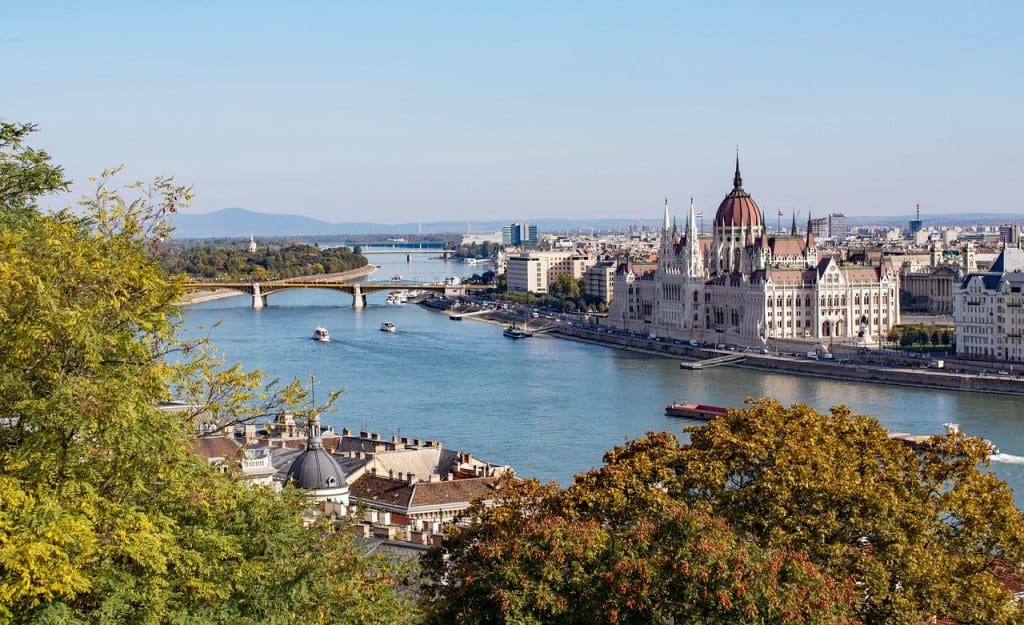
Academia
Hungary is receiving global attention for its low-cost but top-level education in health sciences, engineering, and the natural sciences. Universities like Eötvös Loránd University, the University of Szeged, and Semmelweis University are the preferred choices of international students because they offer competitively priced programs in English.
Top Universities:
- Eötvös Loránd University (#651-700 QS 2024)
- University of Szeged (#801-1000 QS 2024)
Student Experience
Studying in Hungary offers a compelling student experience combining academics and cultural exploration. Lively, low-cost cities such as Budapest, Szeged, or Debrecen strengthen the successful mixture of long-standing historical buildings and modern constructions. Hungary ranks well among students in terms of their happiness with the study program, backing its academic performance and cost of living.
Quality of Life
Hungary ranks well for safety and security, as well as quality of life. Its low-cost of living, well-operated transportation system, and rich cultural background make it both an educational and adventurous experience for students.
Postgraduate Routes & Settlement
Students from abroad can choose to register in Hungary for a maximum of nine months if they have enough money to show for a visa and a job is available. Individuals can obtain a working permit through employment. The residency path is typically very close to five years, while citizenship can be requested after 8 years if language and integration prerequisites are satisfied.
Ease of Visa
Unlike many other countries, acquiring a visa for Hungary is not such a hassle. Proof of admission, sufficient funds to cover expenses and health insurance are required. Usually, it takes between 4 and 6 weeks for the processing.
Cost Breakdown
| Tuition Fees | EUR 1,500 – 3,000 (public universities) |
| Proof of Funds | EUR 4,000 per year |
| Visa Fee | EUR 60 |
| Healthcare | EUR 50-100/year (student insurance) |
How IAS can help
IAS expert immigration lawyers can help you prepare your visa application, check your documents, and determine your eligibility.
We can also help you explore your long-term prospects for postgraduation routes including Graduate Visas, Work Visas, Business Visas, and Family Visas, as well as settlement and citizenship routes.
We specialise in visas but also offer support in moving to a new country. If you’d like to learn more about your routes in Europe or worldwide, be it for student visas or alternatives, our experienced solicitors are here to help. Get in touch on +44 (0)333 414 9244 or message online to get started.
Table of Contents
Table of Contents will appear here.Legal Disclaimer
The information provided is for general informational purposes only and does not constitute legal advice. While we make every effort to ensure accuracy, the law may change, and the information may not reflect the most current legal developments. No warranty is given regarding the accuracy or completeness of the information, and we do not accept liability in such cases. We recommend consulting with a qualified lawyer at Immigration Advice Service before making any decisions based on the content provided.





